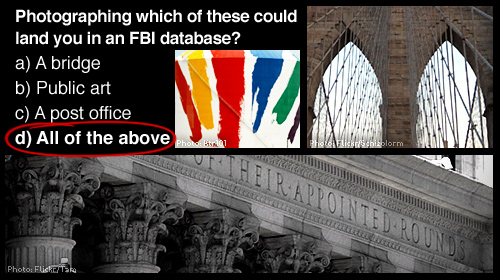
What does an 86-year-old art photographer have in common with a young man with a video game habit?
Not just a proclivity for perfectly innocuous hobbies, unfortunately. These days, engaging in either activity can get the FBI on your case.
Today, the ņŌįń√ŇŅ™ĹĪĹŠĻŻ and our partners at Advancing Justice‚ÄďAsian Law Caucus and Bingham McCutchen are taking the federal government to court over a surveillance program that targets people even if they are engaging in entirely innocent and constitutionally protected activity, and encourages religious profiling. As if that weren‚Äôt enough, the Suspicious Activity Reporting (SAR) program also violates the government‚Äôs own rules for the collection of criminal intelligence.
James Prigoff is one of our clients. He is 86 years old, and a renowned photographer of public art. He has lectured at universities and had his work exhibited at museums around the world. In 2004, he was stopped by security guards in Boston while attempting to take photos of a famous piece of public art called the Rainbow Swash, which is painted on a natural gas storage tank. Several months later, the FBI tracked him down at his house in Sacramento to question him about his activities in Boston.
Tariq Razak, a young scientist and Pakistani-American, is another plaintiff in our case. He became the subject of a SAR after a visit to a train depot in Santa Ana, California, where he had an appointment with the county employment resource center. He walked around the depot looking for the resource center, and his mother, who was wearing a hijab, accompanied him. He later discovered that this conduct led to a SAR describing him as ‚Äúa male of Middle Eastern descent‚ÄĚ who was suspicious because he was ‚Äúconstantly surveying all areas of the facility‚ÄĚ and because he met up with a ‚Äúfemale in a white burka head dress.‚ÄĚ
Our other clients were also unfairly targeted, falling under government scrutiny for activities ranging from buying computers to playing video games. Several of them were profiled due to their perceived religious beliefs.
Click here for more on our plaintiffs.
These ‚Äúsuspicious activities‚ÄĚ may be absurd, but there‚Äôs nothing funny about the program. The Department of Justice (DOJ) and the , a post-9/11 agency tasked with coordinating national security intelligence-sharing, have adopted lax standards for what constitutes ‚Äúsuspicious activity.‚ÄĚ These standards violate a DOJ regulation from 1978 that prohibits law enforcement from sharing ‚Äúintelligence‚ÄĚ about individuals unless the information is supported by reasonable suspicion of criminal activity. The 1978 regulation was adopted in the wake of prior domestic surveillance abuses.
Predictably, eschewing those protections has turned back the clock. The government is ignoring sensible limits on criminal intelligence collection and not just law enforcement, but also private security guards, shopkeepers, hotel owners, and even neighbors, to collect and share information about innocent conduct.
For example:
- Hotels are advised to be on the lookout for guests who "request specific room assignments or locations" or use "payphones for outgoing calls."
- Rental car companies are instructed that "providing multiple names" on rental paperwork is to be "considered suspicious."
- Hobby shops should be wary of customers with an "unusual interest" in remote-controlled aircraft and those who pay in cash.
- The general public is cautioned to report "unusual activity," including "people acting suspiciously" and "people in places where they do not belong."
If ‚Äúacting suspiciously‚ÄĚ or being somewhere someone thinks you don‚Äôt ‚Äúbelong‚ÄĚ is enough to put people into federal counter-terrorism databases, it‚Äôs no wonder the databases are full of irrelevant information and reports targeting Muslims, South Asians, and Arab Americans. As you may remember from , we obtained through Public Records Act requests include reports with subjects like ‚ÄúSuspicious ME [Middle Eastern] Males Buy Several Large Pallets of Water.‚ÄĚ It‚Äôs also no wonder law enforcement experts the SAR program for ‚Äúflooding‚ÄĚ law enforcement with ‚Äúwhite noise.‚ÄĚ
Today our clients are challenging a program through which innocuous and even constitutionally protected activity is being reported as ‚Äúsuspicious‚ÄĚ and leading to federal law enforcement scrutiny. This program not only violates federal privacy protections for ‚Äúintelligence‚ÄĚ sharing. It encourages a culture of fear and distrust, undermining our freedom with no known benefit to our safety.
Learn more about government surveillance and other civil liberties issues: Sign up for breaking news alerts, , and .

